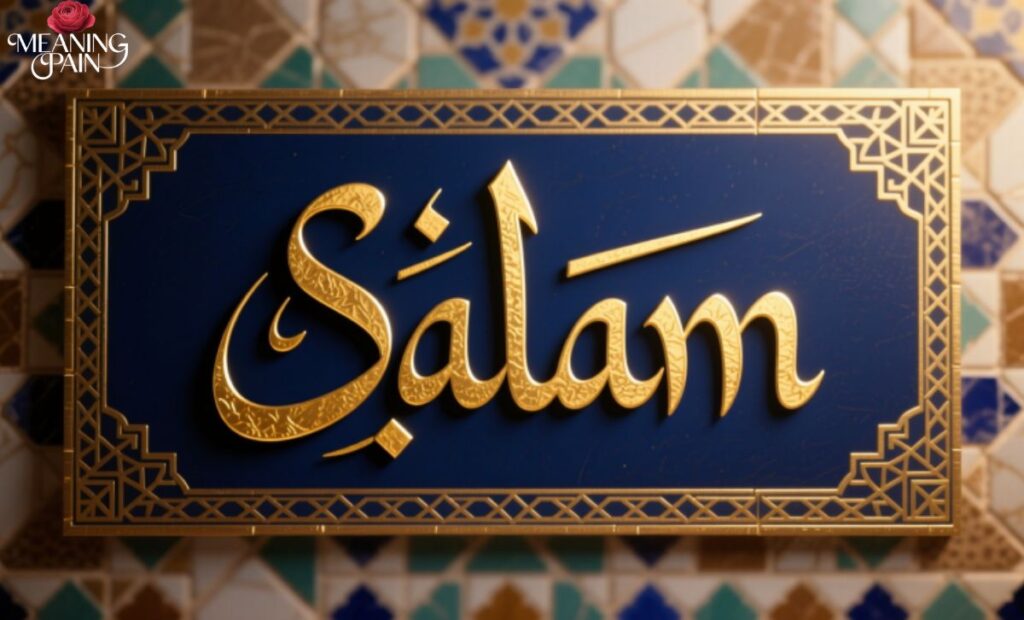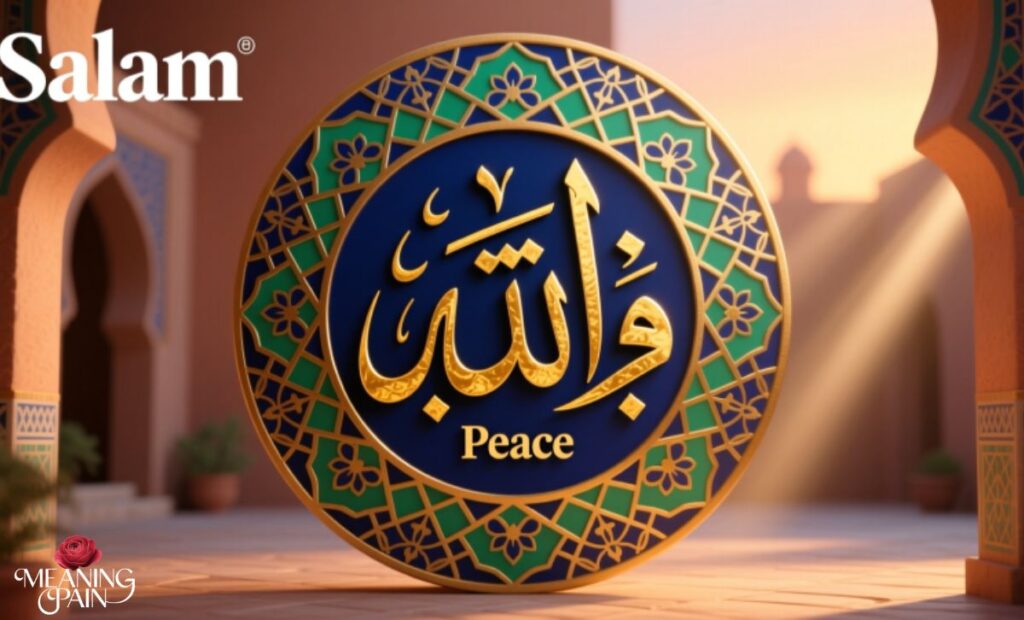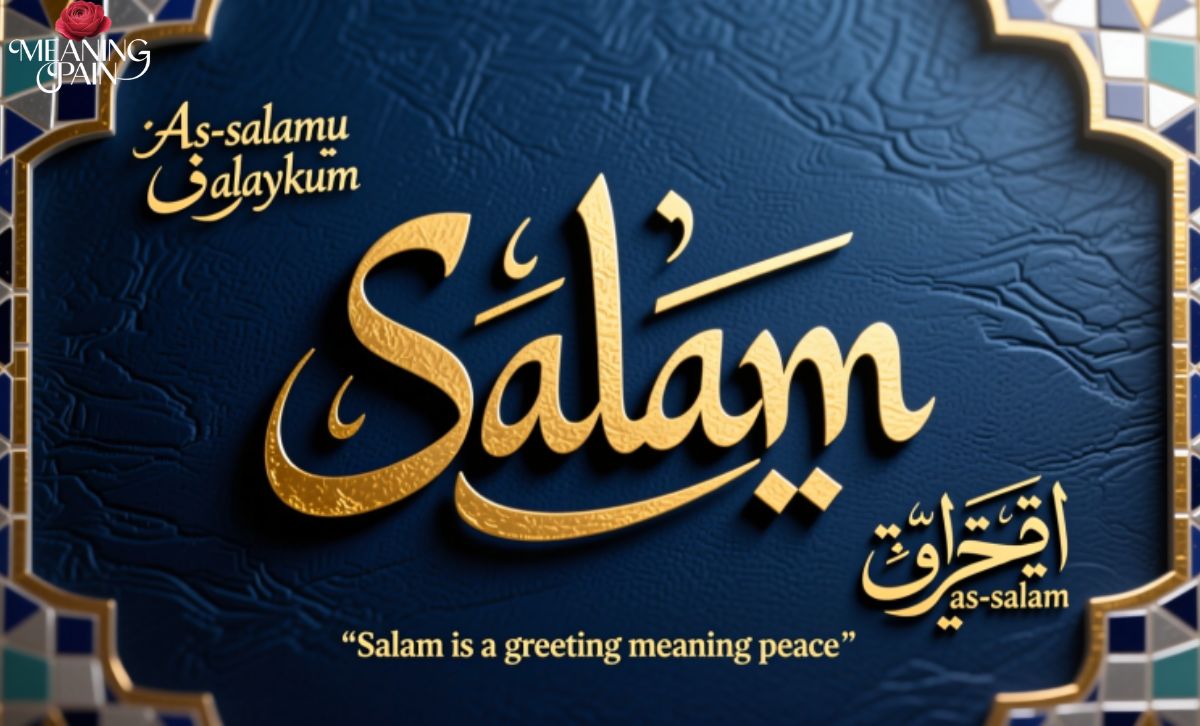“Salam” is one of the most beautiful words in the Arabic language. It means “peace” and carries deep spiritual and cultural significance. Muslims around the world use this word every single day. When you hear someone say “Salam,” they are wishing you peace and safety. The word comes from the same root as “Islam,” which also relates to peace and submission to God.
You will encounter “Salam” in many different forms and situations. The most common greeting is “As-salamu alaikum,” which means “peace be upon you.” People say this when they meet friends, family, or even strangers. You can also use “Salam” as a short, friendly greeting on its own. The word appears in prayers, religious texts, and everyday conversations. Understanding “Salam” helps you connect with Arabic speakers and appreciate Islamic culture better.
Salam Meaning in Arabic

- Salam means peace in Arabic.
- Arabic: سلام تعني السلام
- Salam represents safety and security.
- Arabic: سلام تمثل الأمان والأمن
- Salam signifies harmony between people.
- Arabic: سلام تدل على الانسجام بين الناس
- Salam conveys tranquility and calmness.
- Arabic: سلام تعبر عن الهدوء والسكينة
- Salam is a greeting used daily.
- Arabic: سلام هي تحية تستخدم يومياً
- Salam shows respect to others.
- Arabic: سلام تظهر الاحترام للآخرين
- Salam brings blessings when spoken.
- Arabic: سلام تجلب البركات عند قولها
- Salam creates positive energy around you.
- Arabic: سلام تخلق طاقة إيجابية حولك
- Salam is a Sunnah of Prophet Muhammad.
- Arabic: سلام هي سنة النبي محمد
- Salam promotes unity among Muslims.
- Arabic: سلام تعزز الوحدة بين المسلمين
What Is Salam in Arabic

- Salam is an Arabic word with deep meaning.
- Arabic: سلام هي كلمة عربية ذات معنى عميق
- Salam is a divine attribute of Allah.
- Arabic: سلام هي صفة إلهية لله
- Salam is a form of supplication.
- Arabic: سلام هي شكل من أشكال الدعاء
- Salam is a wish for others’ wellbeing.
- Arabic: سلام هي أمنية لرفاهية الآخرين
- Salam is a religious obligation in Islam.
- Arabic: سلام هي واجب دينى في الإسلام
- Salam is a beautiful tradition in Muslim culture.
- Arabic: سلام هي تقليد جميل في الثقافة الإسلامية
- Salam is a verbal exchange between people.
- Arabic: سلام هي تبادل لفظي بين الناس
- Salam is a sign of brotherhood.
- Arabic: سلام هي علامة الأخوة
- Salam is a prayer for someone’s protection.
- Arabic: سلام هي دعاء لحماية شخص ما
- Salam is a spiritual connection between Muslims.
- Arabic: سلام هي صلة روحية بين المسلمين
Salam Arabic Meaning with Examples

- “As-salamu alaikum” means peace be upon you.
- Arabic: السلام عليكم تعني السلام عليك
- “Wa alaikum salam” means and upon you be peace.
- Arabic: وعليكم السلام تعني وعليك السلام
- “Salam everyone” is a casual greeting.
- Arabic: سلام للجميع هي تحية غير رسمية
- “Dar al-Salam” means house of peace.
- Arabic: دار السلام تعني بيت السلام
- “Salamat” means safety in some dialects.
- Arabic: سلامات تعني الأمان في بعض اللهجات
- “Salam upon the prophets” is a religious phrase.
- Arabic: سلام على الأنبياء هي عبارة دينية
- “Spread salam” means promote peace.
- Arabic: انشروا السلام تعني عززوا السلام
- “Salaam cafe” shows naming with peaceful meaning.
- Arabic: مقهى سلام يظهر التسمية بمعنى سلمي
- “Salam brother” is a friendly call.
- Arabic: سلام أخي هي نداء ودي
- “In salam” means in peace or safely.
- Arabic: في سلام تعني بأمان
Read More: https://meaningpain.com/word-qalbi-meaning-in-arabic/
Salam in Quran

- Salam appears in many verses of the Quran.
- Arabic: سلام تظهر في آيات كثيرة من القرآن
- Allah is called “As-Salam” (The Peace).
- Arabic: الله يدعى السلام
- Jannah is called “Dar al-Salam” (Home of Peace).
- Arabic: الجنة تسمى دار السلام
- Angels say “Salam” to believers in Paradise.
- Arabic: الملائكة يقولون سلام للمؤمنين في الجنة
- “Salamun qawlan” means words of peace from Allah.
- Arabic: سلاماً قولاً تعني كلمات سلام من الله
- Ibrahim received “Salam” from his Lord.
- Arabic: إبراهيم تلقى سلام من ربه
- “Salamun alaykum” is said in Surah Ar-Ra’d.
- Arabic: سلام عليكم قيلت في سورة الرعد
- Peace is the greeting of Paradise dwellers.
- Arabic: السلام هو تحية أهل الجنة
- Salam is a reward for righteous people.
- Arabic: سلام هي مكافأة للصالحين
- “Salam to you” appears in Surah Yasin.
- Arabic: سلام عليك تظهر في سورة يس
- The Quran uses salam to show divine mercy.
- Arabic: القرآن يستخدم سلام لإظهار الرحمة الإلهية
- Salam is the first word angels speak to believers.
- Arabic: سلام هي أول كلمة تنطقها الملائكة للمؤمنين
- Prophets were greeted with salam by Allah.
- Arabic: الأنبياء تم تحيتهم بسلام من الله
- “Salamun upon Noah” is mentioned in the Quran.
- Arabic: سلام على نوح مذكورة في القرآن
- Salam represents God’s protection over believers.
- Arabic: سلام تمثل حماية الله على المؤمنين
- The Night of Decree is described as full of peace.
- Arabic: ليلة القدر موصوفة بأنها مليئة بالسلام
- Salam is used in Quranic prayers and supplications.
- Arabic: سلام تستخدم في الصلوات والأدعية القرآنية
- “Salamun upon Moses” shows honor to prophets.
- Arabic: سلام على موسى تظهر التكريم للأنبياء
- Salam in Quran teaches peaceful coexistence.
- Arabic: سلام في القرآن تعلم التعايش السلمي
- The Quran ends prayers with “salam” for completion.
- Arabic: القرآن ينهي الصلوات بسلام للإكمال
Salam in Arabic Grammar
- Salam is a masculine noun in Arabic.
- Arabic: سلام هو اسم مذكر في العربية
- Salam belongs to the root letters S-L-M.
- Arabic: سلام ينتمي إلى الجذر س-ل-م
- Salam is a verbal noun (masdar).
- Arabic: سلام هو اسم مصدر
- Salam can be definite with “al” (Al-Salam).
- Arabic: سلام يمكن أن يكون معرفة بـ ال (السلام)
- Salam takes tanween when indefinite (Salamun).
- Arabic: سلام يأخذ التنوين عند التنكير (سلامٌ)
- Salam is in the nominative case when a subject.
- Arabic: سلام في حالة الرفع عندما يكون فاعل
- Salam changes with grammatical cases (i’rab).
- Arabic: سلام يتغير مع الحالات الإعرابية
- Salam is non-plural in most uses.
- Arabic: سلام غير جمع في معظم الاستخدامات
- Salam forms compound phrases easily.
- Arabic: سلام يشكل عبارات مركبة بسهولة
- Salam follows Arabic word order rules.
- Arabic: سلام يتبع قواعد ترتيب الكلمات العربية
- Salam uses prepositions like “ala” (upon).
- Arabic: سلام يستخدم حروف الجر مثل على
- Salam derives other words from the same root.
- Arabic: سلام يشتق كلمات أخرى من نفس الجذر
- Salam is a tri-literal root word.
- Arabic: سلام هو كلمة من جذر ثلاثي
Sallam Meaning in Arabic

- Sallam means to greet someone.
- Arabic: سلّم تعني أن تحيي شخصاً ما
- Sallam is a verb in Arabic.
- Arabic: سلّم هو فعل في العربية
- Sallam means to hand over something.
- Arabic: سلّم تعني أن تسلم شيئاً ما
- Sallam shows action of giving peace.
- Arabic: سلّم تظهر فعل إعطاء السلام
- Sallam is doubled with shaddah (ّ).
- Arabic: سلّم مضعف بالشدة
- Sallam means to surrender or submit.
- Arabic: سلّم تعني الاستسلام أو الخضوع
- Sallam can mean to deliver goods.
- Arabic: سلّم يمكن أن تعني توصيل البضائع
- Sallam means to acknowledge receipt.
- Arabic: سلّم تعني الإقرار بالاستلام
- Sallam alayhi means he greeted him.
- Arabic: سلّم عليه تعني حياه
- Sallam is a Form II verb (intensive).
- Arabic: سلّم هو فعل من الباب الثاني (للتكثير)
- Sallam shows completion of transfer.
- Arabic: سلّم تظهر إتمام النقل
- Sallam implies respect in greeting.
- Arabic: سلّم تتضمن الاحترام في التحية
- Sallam means to make safe or secure.
- Arabic: سلّم تعني جعل آمن أو محمي
Salam Cultural Significance
- Salam promotes community bonding among Muslims.
- Arabic: سلام تعزز الترابط المجتمعي بين المسلمين
- Salam is the first thing taught to children.
- Arabic: سلام هو أول شيء يعلم للأطفال
- Salam reflects Islamic values of peace.
- Arabic: سلام تعكس القيم الإسلامية للسلام
- Salam is used in daily interactions everywhere.
- Arabic: سلام تستخدم في التفاعلات اليومية في كل مكان
- Salam breaks social barriers between strangers.
- Arabic: سلام تكسر الحواجز الاجتماعية بين الغرباء
- Salam is a symbol of Muslim identity.
- Arabic: سلام هي رمز للهوية الإسلامية
- Salam strengthens family ties and relationships.
- Arabic: سلام تقوي الروابط العائلية والعلاقات
- Salam is said when entering homes.
- Arabic: سلام تقال عند دخول المنازل
- Salam is part of Islamic etiquette (adab).
- Arabic: سلام جزء من الآداب الإسلامية
- Salam appears in Arabic literature and poetry.
- Arabic: سلام تظهر في الأدب والشعر العربي
- Salam is used in letters and messages.
- Arabic: سلام تستخدم في الرسائل والرسائل
- Salam creates positive atmosphere in gatherings.
- Arabic: سلام تخلق أجواء إيجابية في التجمعات
- Salam is a universal greeting across Arab nations.
- Arabic: سلام هي تحية عالمية عبر الدول العربية
Common Mistakes About Salam
- Saying “Salam” to non-Muslims is actually encouraged.
- Arabic: قول سلام لغير المسلمين في الواقع مشجع
- Shortening “As-salamu alaikum” isn’t always incorrect.
- Arabic: اختصار السلام عليكم ليس دائماً خاطئاً
- Women can definitely initiate salam greetings.
- Arabic: النساء يمكنهن بالتأكيد بدء تحية السلام
- Salam doesn’t require physical contact like handshakes.
- Arabic: سلام لا يتطلب اتصال جسدي مثل المصافحة
- Replying with “Hello” instead of “Wa alaikum salam” misses rewards.
- Arabic: الرد بمرحبا بدلاً من وعليكم السلام يفوت الأجر
- Salam isn’t only for formal occasions.
- Arabic: سلام ليست فقط للمناسبات الرسمية
- Not responding to salam is considered rude.
- Arabic: عدم الرد على السلام يعتبر وقاحة
- Salam should be said clearly and audibly.
- Arabic: سلام يجب أن تقال بوضوح وبصوت مسموع
- Texting “Salam” still carries blessings and meaning.
- Arabic: إرسال سلام بالرسائل النصية لا يزال يحمل البركات والمعنى
- Salam isn’t limited to Arabic speakers only.
- Arabic: سلام ليست مقتصرة على الناطقين بالعربية فقط
- Using “Salaam” with extra “a” is just a spelling variation.
- Arabic: استخدام سلام بألف إضافية هو مجرد اختلاف إملائي
Why Learn Salam in Arabic
- Salam helps you connect with Muslims worldwide.
- Arabic: سلام يساعدك على التواصل مع المسلمين في جميع أنحاء العالم
- Learning salam shows respect for Islamic culture.
- Arabic: تعلم السلام يظهر الاحترام للثقافة الإسلامية
- Salam opens doors to Arabic-speaking communities.
- Arabic: سلام يفتح الأبواب للمجتمعات الناطقة بالعربية
- Using salam creates instant friendship bonds.
- Arabic: استخدام السلام يخلق روابط صداقة فورية
- Salam is easy to pronounce and remember.
- Arabic: سلام سهل النطق والتذكر
- Knowing salam improves travel experiences in Arab countries.
- Arabic: معرفة السلام تحسن تجارب السفر في الدول العربية
- Salam earns you spiritual rewards in Islam.
- Arabic: سلام يكسبك أجر روحي في الإسلام
- Speaking salam demonstrates cultural awareness and sensitivity.
- Arabic: نطق السلام يوضح الوعي والحساسية الثقافية
- Salam is the foundation of Arabic greetings.
- Arabic: سلام هو أساس التحيات العربية
- Learning salam helps understand Quran better.
- Arabic: تعلم السلام يساعد على فهم القرآن بشكل أفضل
- Salam builds bridges between different cultures.
- Arabic: سلام يبني جسوراً بين الثقافات المختلفة
- Using salam shows humility and kindness.
- Arabic: استخدام السلام يظهر التواضع واللطف
- Salam helps you start conversations easily.
- Arabic: سلام يساعدك على بدء المحادثات بسهولة
- Knowing salam is useful in business settings.
- Arabic: معرفة السلام مفيدة في الأوساط التجارية
- Salam promotes world peace and understanding.
- Arabic: سلام يعزز السلام والتفاهم العالمي
Ladder in Arabic Meaning
- Ladder in Arabic is called “Sullam” (سُلَّم).
- Arabic: السلم في العربية يسمى سُلَّم
- Sullam means a climbing tool or steps.
- Arabic: سُلَّم يعني أداة تسلق أو درجات
- Sullam is used to reach high places.
- Arabic: سُلَّم يستخدم للوصول إلى الأماكن العالية
- Sullam can be made of wood or metal.
- Arabic: سُلَّم يمكن أن يكون من الخشب أو المعدن
- Sullam has rungs or steps (darajat).
- Arabic: سُلَّم له درجات أو خطوات
- Sullam is masculine noun in Arabic.
- Arabic: سُلَّم اسم مذكر في العربية
- Sullam shares the same root as Salam (S-L-M).
- Arabic: سُلَّم يشترك في نفس الجذر مع السلام (س-ل-م)
- Sullam comes from root meaning ascension.
- Arabic: سُلَّم يأتي من جذر يعني الصعود
- Portable ladder is “sullam mutaharrik” in Arabic.
- Arabic: السلم المتنقل هو سلم متحرك بالعربية
- Step ladder is called “sullam darajat“.
- Arabic: سلم الدرج يسمى سلم درجات
- Extension ladder is “sullam qabil littamaddud“.
- Arabic: السلم القابل للتمديد هو سلم قابل للتمدد
- Rope ladder is “sullam habl” in Arabic.
- Arabic: سلم الحبل هو سلم حبل بالعربية
- Sullam appears in construction vocabulary.
- Arabic: سُلَّم يظهر في مفردات البناء
- Climbing a ladder is “tasalluq al-sullam”.
- Arabic: تسلق السلم هو تسلق السلم
- Sullam symbolizes progress and advancement.
- Arabic: سُلَّم يرمز إلى التقدم والتطور
- Sullam is used in idioms about success.
- Arabic: سُلَّم يستخدم في التعابير عن النجاح
- “Sullam al-najah” means ladder of success.
- Arabic: سلم النجاح يعني سلم النجاح
- Fire ladder is “sullam itfa’” in Arabic.
- Arabic: سلم الإطفاء هو سلم إطفاء بالعربية
- Sullam is essential in building work.
- Arabic: سُلَّم ضروري في أعمال البناء
- Folding ladder is “sullam qabil littawi“.
- Arabic: السلم القابل للطي هو سلم قابل للطوي
FAQs
What is salam in Arabic language?
Salam (سلام) means “peace” in Arabic. It is used as a greeting and appears throughout the Quran as a blessing.
How to do salam in Arabic?
Say “As-salamu alaikum” (السلام عليكم) when greeting someone. The response is “Wa alaikum salam” (وعليكم السلام).
Do Arabs say salam?
Yes, Arabs use salam daily as their main greeting. Both Muslim and non-Muslim Arabs say it regularly.
What is assalamu alaikum full Arabic?
The full form is “As-salamu alaikum wa rahmatullahi wa barakatuh” (السلام عليكم ورحمة الله وبركاته). It means “peace, mercy, and blessings of Allah be upon you.”
How to greet a person in Arabic?
Say “As-salamu alaikum” for a respectful greeting anytime. You can also use “Marhaba” (مرحباً) or “Ahlan” (أهلاً) for casual hellos.
Conclusion
“Salam” is a powerful word that brings peace and connection to people everywhere. We have learned its meaning, uses, and importance in Arabic culture and Islam. This simple greeting can create friendship, show respect, and spread positive energy in your daily life.
Now you know how to use “Salam” correctly and confidently. Start greeting people with “As-salamu alaikum” and feel the difference it makes. Remember, every time you say “Salam,” you are sharing peace with the world. Make this beautiful Arabic word part of your vocabulary today.

James Dean was an American actor and cultural icon of teenage rebellion, best known for Rebel Without a Cause, Giant, and East of Eden.








